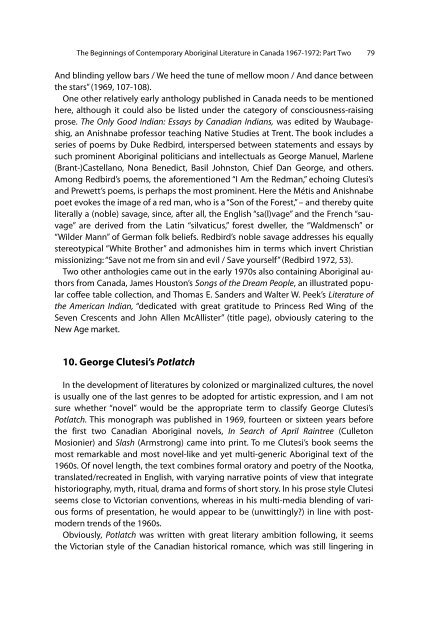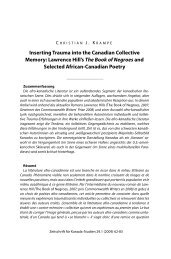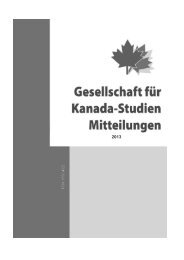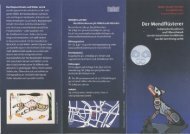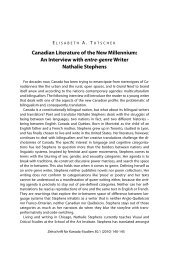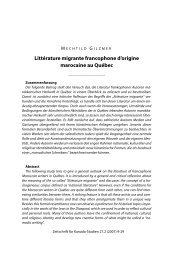The Beginnings of Contemporary Aboriginal Literature in Canada ...
The Beginnings of Contemporary Aboriginal Literature in Canada ...
The Beginnings of Contemporary Aboriginal Literature in Canada ...
You also want an ePaper? Increase the reach of your titles
YUMPU automatically turns print PDFs into web optimized ePapers that Google loves.
<strong>The</strong> <strong>Beg<strong>in</strong>n<strong>in</strong>gs</strong> <strong>of</strong> <strong>Contemporary</strong> <strong>Aborig<strong>in</strong>al</strong> <strong>Literature</strong> <strong>in</strong> <strong>Canada</strong> 1967-1972: Part Two 79<br />
And bl<strong>in</strong>d<strong>in</strong>g yellow bars / We heed the tune <strong>of</strong> mellow moon / And dance between<br />
the stars” (1969, 107-108).<br />
One other relatively early anthology published <strong>in</strong> <strong>Canada</strong> needs to be mentioned<br />
here, although it could also be listed under the category <strong>of</strong> consciousness-rais<strong>in</strong>g<br />
prose. <strong>The</strong> Only Good Indian: Essays by Canadian Indians, was edited by Waubageshig,<br />
an Anishnabe pr<strong>of</strong>essor teach<strong>in</strong>g Native Studies at Trent. <strong>The</strong> book <strong>in</strong>cludes a<br />
series <strong>of</strong> poems by Duke Redbird, <strong>in</strong>terspersed between statements and essays by<br />
such prom<strong>in</strong>ent <strong>Aborig<strong>in</strong>al</strong> politicians and <strong>in</strong>tellectuals as George Manuel, Marlene<br />
(Brant-)Castellano, Nona Benedict, Basil Johnston, Chief Dan George, and others.<br />
Among Redbird’s poems, the aforementioned “I Am the Redman,” echo<strong>in</strong>g Clutesi’s<br />
and Prewett’s poems, is perhaps the most prom<strong>in</strong>ent. Here the Métis and Anishnabe<br />
poet evokes the image <strong>of</strong> a red man, who is a “Son <strong>of</strong> the Forest,” – and thereby quite<br />
literally a (noble) savage, s<strong>in</strong>ce, after all, the English “sa(l)vage” and the French “sauvage”<br />
are derived from the Lat<strong>in</strong> “silvaticus,” forest dweller, the “Waldmensch” or<br />
“Wilder Mann” <strong>of</strong> German folk beliefs. Redbird’s noble savage addresses his equally<br />
stereotypical “White Brother” and admonishes him <strong>in</strong> terms which <strong>in</strong>vert Christian<br />
missioniz<strong>in</strong>g: “Save not me from s<strong>in</strong> and evil / Save yourself” (Redbird 1972, 53).<br />
Two other anthologies came out <strong>in</strong> the early 1970s also conta<strong>in</strong><strong>in</strong>g <strong>Aborig<strong>in</strong>al</strong> authors<br />
from <strong>Canada</strong>, James Houston’s Songs <strong>of</strong> the Dream People, an illustrated popular<br />
c<strong>of</strong>fee table collection, and Thomas E. Sanders and Walter W. Peek’s <strong>Literature</strong> <strong>of</strong><br />
the American Indian, “dedicated with great gratitude to Pr<strong>in</strong>cess Red W<strong>in</strong>g <strong>of</strong> the<br />
Seven Crescents and John Allen McAllister” (title page), obviously cater<strong>in</strong>g to the<br />
New Age market.<br />
10. George Clutesi’s Potlatch<br />
In the development <strong>of</strong> literatures by colonized or marg<strong>in</strong>alized cultures, the novel<br />
is usually one <strong>of</strong> the last genres to be adopted for artistic expression, and I am not<br />
sure whether “novel” would be the appropriate term to classify George Clutesi’s<br />
Potlatch. This monograph was published <strong>in</strong> 1969, fourteen or sixteen years before<br />
the first two Canadian <strong>Aborig<strong>in</strong>al</strong> novels, In Search <strong>of</strong> April Ra<strong>in</strong>tree (Culleton<br />
Mosionier) and Slash (Armstrong) came <strong>in</strong>to pr<strong>in</strong>t. To me Clutesi’s book seems the<br />
most remarkable and most novel-like and yet multi-generic <strong>Aborig<strong>in</strong>al</strong> text <strong>of</strong> the<br />
1960s. Of novel length, the text comb<strong>in</strong>es formal oratory and poetry <strong>of</strong> the Nootka,<br />
translated/recreated <strong>in</strong> English, with vary<strong>in</strong>g narrative po<strong>in</strong>ts <strong>of</strong> view that <strong>in</strong>tegrate<br />
historiography, myth, ritual, drama and forms <strong>of</strong> short story. In his prose style Clutesi<br />
seems close to Victorian conventions, whereas <strong>in</strong> his multi-media blend<strong>in</strong>g <strong>of</strong> various<br />
forms <strong>of</strong> presentation, he would appear to be (unwitt<strong>in</strong>gly?) <strong>in</strong> l<strong>in</strong>e with postmodern<br />
trends <strong>of</strong> the 1960s.<br />
Obviously, Potlatch was written with great literary ambition follow<strong>in</strong>g, it seems<br />
the Victorian style <strong>of</strong> the Canadian historical romance, which was still l<strong>in</strong>ger<strong>in</strong>g <strong>in</strong>


